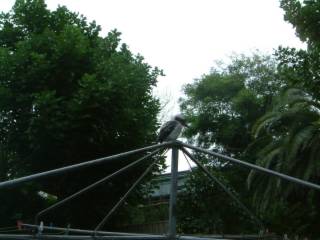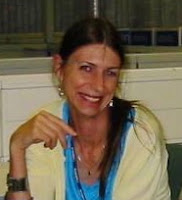Monday, February 28, 2005
Saturday, February 05, 2005
On not always feeling I was a woman (!)
I was asked in a recent radio interview if I felt I had always been a woman. I surprised the interviewer by saying “No, I haven’t”. (shock, horror! Is she allowed to say that?).
It was precisely the belief that I wasn’t a girl or a woman, no matter how much I sensed there was something fundamentally “feminine” about me and no matter how much I yearned and prayed to be a girl and a woman, that caused me such pain and torment over the years of my life.
After all there just wasn’t any doubt that I had a boy’s body and that everyone thought I was a boy; expected and demanded that I be a boy. I didn't think there was anything I could do about that. It just seemed like a strange, shameful aberration in me. For ten years until the age of thirteen I thought I was the only person in the world like that. Not being the protesting type I just went inside. I stayed there pretty much for fifty years.
My sense of being feminine, female has grown from small and vague and ineloquent origins in childhood; evolved, waxed, waned, flared, subsided and been suppressed over the years – in denial or in politico-personal compromise.
It was not often expressed openly during the fifty odd years preceding my transition. Oh! There were many occasions in which I “cross-dressed”, sometimes in public; revealed for a brief instant my inner feminine. And I cultivated a rich and highly-detailed parrallel world in fantasy. But really, the moments of expression were comparatively rare in the overall count of my hours and days.
A non-transexual woman's sense of her womanness proceeeds, like the transsexual woman, from the gender identity centres and neurological structuring of her brain but also, greatly, it is "written on her body"; marked out palpably and bloodily and irrevocably and incontrovertibly by the milestones of puberty, menarche, childbirth and menopause. A motif of flesh and blood woven into and through and around the larger motif of her whole life and being.
The non-transsexual woman, on the other hand, grows up with a cruelly disembodied and universally invalidated sense of her womanness; a disembodied and invalidaated sense of self. Her brain centres pour out the same messages and yearnings but there is no body on which to write their testimony and their destiny.
My sense of the feminine was largely interior, amorphous, alienated from both body and society; and a close-guarded secret hedged in by fear, embarrassment, shame, loathing and despair.
I think mostly I felt adrift, alone, alienated in a no-man’s (or no-woman’s) land of hybrid gender; astride a sharp, desolate divide between the sexes and the genders; terribly, secretly isolated. I felt neither man nor woman. I was apparently woman on the inside, apparently man on the outside, nothing, blighted, hopeless, despairing of solution. I always wanted the solution of (magically) becoming complete woman but not believing that was possible in the real world (too scared, too tall, too visible, too obvious, too unfeminine, too weak) I half-heartedly hoped that “it would all go away”.
Certainly, I believed that the love, acceptance and safety I craved were only possible if my transsexualism, and my feminine, were not in the picture. Whenever I had “come out” about those aspects of my self I eventually experienced rejection.
Some transsexual women make much to do about “always being a woman”. I understand that as a simplistically couched expression of the awareness of a deeply felt and enduring sense of being female somewhere in one’s core of identity and consciousness. I understand it also as a plea for validation from an often sceptical if not out rightly hostile world.
Being a woman is more than just having a sense of being woman, of being a woman's brain in a test tube. Being a woman is a lived totality.
I think such an assertion is also a simple, heartfelt desire on the part of the transsexual woman to have had the “ordinary” life of the non-transsexual woman.
But no, I have not always felt that I was a woman. But I did from the age of four or five have a growing awareness of the centrality of a sense of femaleness to my sense of being, to my very existence and an extraordinary and painfully hopeless, desperate yearning to become, to be, first a girl, then a woman, completely, wholly, really.
In all its totality, all its joy and its pain and its blood.
With the world’s help, I have done that, finally, as best as I can.
It was precisely the belief that I wasn’t a girl or a woman, no matter how much I sensed there was something fundamentally “feminine” about me and no matter how much I yearned and prayed to be a girl and a woman, that caused me such pain and torment over the years of my life.
After all there just wasn’t any doubt that I had a boy’s body and that everyone thought I was a boy; expected and demanded that I be a boy. I didn't think there was anything I could do about that. It just seemed like a strange, shameful aberration in me. For ten years until the age of thirteen I thought I was the only person in the world like that. Not being the protesting type I just went inside. I stayed there pretty much for fifty years.
My sense of being feminine, female has grown from small and vague and ineloquent origins in childhood; evolved, waxed, waned, flared, subsided and been suppressed over the years – in denial or in politico-personal compromise.
It was not often expressed openly during the fifty odd years preceding my transition. Oh! There were many occasions in which I “cross-dressed”, sometimes in public; revealed for a brief instant my inner feminine. And I cultivated a rich and highly-detailed parrallel world in fantasy. But really, the moments of expression were comparatively rare in the overall count of my hours and days.
A non-transexual woman's sense of her womanness proceeeds, like the transsexual woman, from the gender identity centres and neurological structuring of her brain but also, greatly, it is "written on her body"; marked out palpably and bloodily and irrevocably and incontrovertibly by the milestones of puberty, menarche, childbirth and menopause. A motif of flesh and blood woven into and through and around the larger motif of her whole life and being.
The non-transsexual woman, on the other hand, grows up with a cruelly disembodied and universally invalidated sense of her womanness; a disembodied and invalidaated sense of self. Her brain centres pour out the same messages and yearnings but there is no body on which to write their testimony and their destiny.
My sense of the feminine was largely interior, amorphous, alienated from both body and society; and a close-guarded secret hedged in by fear, embarrassment, shame, loathing and despair.
I think mostly I felt adrift, alone, alienated in a no-man’s (or no-woman’s) land of hybrid gender; astride a sharp, desolate divide between the sexes and the genders; terribly, secretly isolated. I felt neither man nor woman. I was apparently woman on the inside, apparently man on the outside, nothing, blighted, hopeless, despairing of solution. I always wanted the solution of (magically) becoming complete woman but not believing that was possible in the real world (too scared, too tall, too visible, too obvious, too unfeminine, too weak) I half-heartedly hoped that “it would all go away”.
Certainly, I believed that the love, acceptance and safety I craved were only possible if my transsexualism, and my feminine, were not in the picture. Whenever I had “come out” about those aspects of my self I eventually experienced rejection.
Some transsexual women make much to do about “always being a woman”. I understand that as a simplistically couched expression of the awareness of a deeply felt and enduring sense of being female somewhere in one’s core of identity and consciousness. I understand it also as a plea for validation from an often sceptical if not out rightly hostile world.
Being a woman is more than just having a sense of being woman, of being a woman's brain in a test tube. Being a woman is a lived totality.
I think such an assertion is also a simple, heartfelt desire on the part of the transsexual woman to have had the “ordinary” life of the non-transsexual woman.
But no, I have not always felt that I was a woman. But I did from the age of four or five have a growing awareness of the centrality of a sense of femaleness to my sense of being, to my very existence and an extraordinary and painfully hopeless, desperate yearning to become, to be, first a girl, then a woman, completely, wholly, really.
In all its totality, all its joy and its pain and its blood.
With the world’s help, I have done that, finally, as best as I can.




